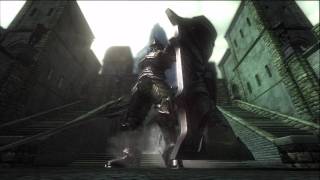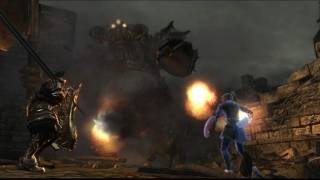Gaming Memories: Demon's Souls
By majormitch 7 Comments
Welcome to “Gaming Memories,” a blog series where I reminisce about my favorite video games. I will slowly but surely get to every game on the list, and speak to why each holds a special place in my heart. That not only means I’ll talk about why I think each is a great game that speaks to my tastes, but also where and how it affected me in a larger context. I hope you enjoy, and thanks for reading.
What do you mean my experience points are also my currency, called “souls”? And I lose it all when I die? Which is autosaved immediately, with no option to create or load a manual save? What are these messages on the ground with incorrect grammar? Who wrote these? Why do all the NPCs act as if they know something I don’t, and then laugh about it? And apparently I can kill them permanently too? There are no tutorials, no waypoints, enemies respawn when I die or rest, and I can’t pause the game? What if I have to step away for a minute? What do I do? What is up with these crystal lizards??
What. Is. This. Game.

Demon’s Souls was weird. It can be a little difficult to remember just how weird it was now, in 2019, as we’ve seen so many similar games in the decade since. But in 2009 there was nothing like Demon’s Souls. It took all of the widely accepted design lessons of the previous decade and chucked them right out the window. It came out of absolutely nowhere too. In one of the boldest moves for a AAA studio, much less for a Japanese game trying to make an impact in the west, Demon’s Souls had no marketing behind it whatsoever. Nobody had any clue what this thing was until we were playing it for ourselves, and the fervor slowly built after launch as we all collectively tried to figure it out. Genuine surprise and mystery almost never happen to that degree in video games anymore, which made Demon’s Souls one of the most memorable and affecting gaming experiences I’ve had. The game was littered with moments, both big and small, unlike anything I had encountered in a game before: a dragon swooping down and setting an entire bridge worth of soldiers on fire, a seemingly friendly thief stabbing me in the back after I gave him my trust, another human player invading my world as a required boss fight, or simply trying to swing a sword in a tight corridor, only to have it bounce off the wall in futility. Demon’s Souls made its own rules, which made for a true and special vision.
More than its uniqueness, however, Demon’s Souls quickly became known for being “that hard game”. Where most games of the time strived to protect players from themselves as much as possible, Demon’s Souls let players screw up, often, and punished them when they did. You couldn’t take anything for granted here; all of your actions counted, and there was no getting around it. You lost your experience points and currency when you died, you couldn’t save scum, you could accidentally kill important NPCs, there was nothing telling you where to go or what to do, and you couldn’t even pause the game. Most importantly, levels and enemies were designed just so to make you consider every step and every swing you took. But those opportunities for failure were also opportunities for thoughtful, engaging play, and I might argue you can’t have one without the other. There was an intentionality to everything Demon’s Souls did, which encouraged you to pay attention and consider your actions every step of the way. And if you got a little careless? Yeah, you’d suffer some setbacks. But you could also go back and give it another shot with a different approach. Demon’s Souls demonstrated the value of letting players define their own victories as well as their own failures, and overcoming its challenges were infinitely more rewarding thanks to such intentional and thoughtful design.

Demon’s Souls’ design was not just to make it different and difficult either; this was also a very smart and forward-thinking game in a number of subtle but striking ways. It was a robust, exciting, and just plain good action RPG across the board. Its open-ended character creation and stat growth allowed for seemingly limitless, creative builds that felt meaningful. Combat was precise, yet varied dramatically depending on what weapons and spells you used. Every level was cleverly designed to incorporate the environment, and each felt aesthetically and mechanically distinct. The enemy variety was equally dynamic, including some awesome boss fights. Those enemies were subject to the same rules you were too, an important part of the game’s philosophy. Boletaria's atmosphere was thick and effective, and the pacing was just right. Demon’s Souls' biggest innovations, however, may have come in its online features. While it was predominantly a single player outing, you were anything but alone when connected online. First, players could leave (potentially) helpful messages on the ground just about anywhere, which added a communal feel to deciphering the game’s cryptic nature. Second, you could see the bloodstains of fallen players, which gave warnings of impending danger. Finally, players could join each others’ worlds as willing assistants in a tough fight, or devious invaders looking to steal your souls. Demon’s Souls cultivated a sense of camaraderie among its players, and let us experience the adventure, in all its ups and downs, together.
In 2009, there was nothing like Demon’s Souls. It came out of nowhere to turn the industry on its head, and presented an entirely new way of thinking about video games. It feels rarer than it should, but that kind of genuine surprise is one of my favorite things about this entire medium. Playing Demon’s Souls in 2009 was like venturing into the great unknown, a messy and mysterious and perilous quest where no prior gaming knowledge could help you. It was a singular artistic vision I’ll never forget, and remains one of my most personally transformative gaming experiences. I’m not sure the world was ready for Demon’s Souls, and we ended up all the better for it.
